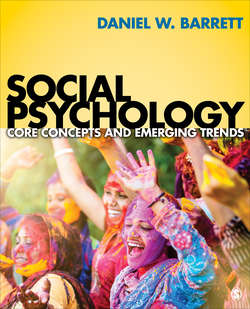Читать книгу Social Psychology - Daniel W. Barrett - Страница 137
На сайте Литреса книга снята с продажи.
Confirmation Bias
ОглавлениеImagine you are about to interview another student to determine if she is extraverted. You are given a set of questions to select from, some of which focus on behaviors and experiences indicative of extraversion (such as how would you liven up a party?) and others of introversion (such as in what situations would you like to be more outgoing?). Would you choose questions the answers to which are more likely to produce evidence consistent or inconsistent with the answer you are seeking? Well if you are like the students in Snyder and Swann’s (1978b) study, you’ll favor the consistent items that focus on extraversion. If, on the other hand, you are trying to learn whether she is introverted, you’ll prefer the introversion items. Why?
n Chapter 1, we described how people are natural hypothesis testers; we develop ideas about how the world works and test our ideas in relevant situations (remember the interviewee’s comment about the interviewer’s legs?) (Ross & Nisbett, 1991). Such hypothesis testing can be influenced by the motivations that are active at the time, thereby enhancing the likelihood that we will reach a desired conclusion (Mullen & Skitka, 2006). When gathering evidence to evaluate the validity of a belief, we tend to look primarily at instances that confirm that belief and to ignore or discount those that do not (Traut-Mattausch, Jonas, Frey, & Zanna, 2011; Trope & Liberman, 1996). For instance, if you are testing the proposition that Norwegian men are handsome, then you are likely to look primarily for cases that could support it (finding Norwegian men who are attractive) rather than those that might undermine it (searching for less attractive Norwegian men) (Snyder & Swann, 1978b). We call this tendency to search only for evidence that supports our beliefs and to ignore information that disagrees with them the confirmation bias (Gilbey & Hill, 2012; Nickerson, 1998; Snyder & Swann, 1978a). Evidence for the confirmation bias has been found in how people assess the accuracy of sex role stereotypes (Marks & Fraley, 2006), assignment of diagnoses by psychiatrists (Mendel et al., 2011), and how people gather evidence about a suspect in criminal investigations (Kukucka & Kassin, 2014; Rassin, Eerland, & Kuijpers, 2010).
Confirmation Bias: Tendency to search only for evidence that supports one’s beliefs and to ignore information that disagrees with them
